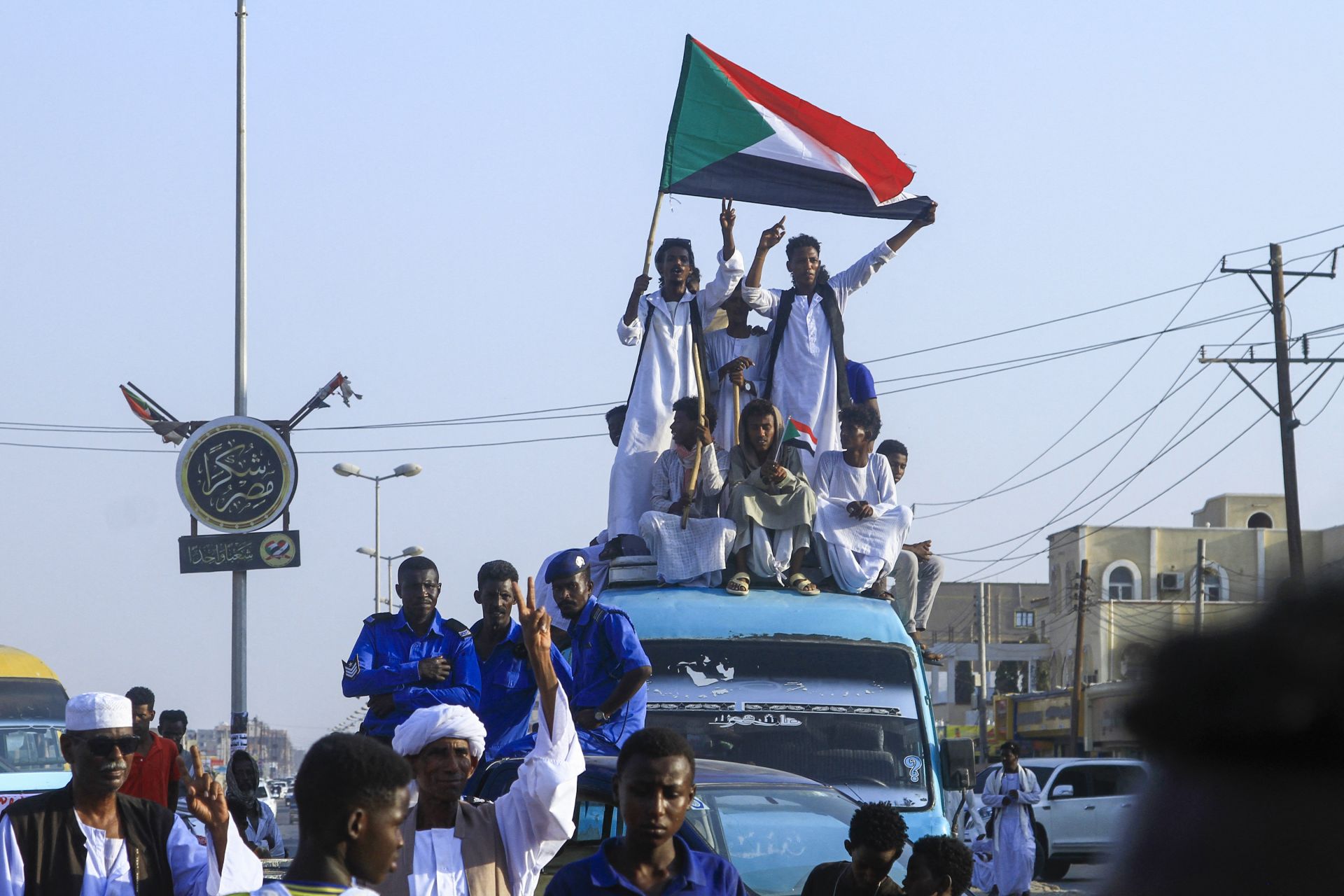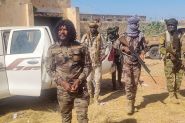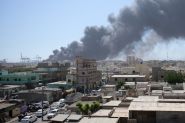- Home
- Middle East
- What Do We Know About Sudan's Shifting Battlefield?

People lift national flags during a rally called for by Sudan's Popular Front for Liberation and Justice in Port Sudan on April 24, 2025, to denounce the siege imposed by the paramilitary Rapid Support Forces (RSF) on El-Fasher city and express support for its residents. ©AFP
The war in Sudan has reached a critical phase that threatens to permanently fracture a country already devastated by displacement, famine, and disease.
What began more than two years ago as a power struggle between the regular army and the paramilitary Rapid Support Forces (RSF) has escalated into a brutal fight for territorial control, with the fiercest clashes now concentrated in the western regions of Darfur and Kordofan.
The army holds the north, east, and center, including the capital Khartoum and Port Sudan – the Red Sea hub, which it has made the headquarters of a transitional government.
The RSF controls much of the south and nearly all of Darfur, where it has set up a rival administration based in the city of Nyala.
Analysts warn that if current front lines stabilize, Sudan could face de facto partition, risking a prolonged, Libya-style fragmentation with rival administrations controlling separate zones.
Here are the latest battlefield updates in the conflict that has killed tens of thousands of people and driven nearly 12 million from their homes.
Darfur: El-Fasher Under Siege
In August, the RSF launched its fiercest assault yet on El-Fasher, the last major city in Darfur still in the army's hands, after besieging it since May last year.
Around 260,000 civilians are trapped in the city, with no access to external aid. Residents report surviving on animal feed, and those fleeing face rape, beatings and killings, according to UN reports and survivors who spoke to AFP.
In April, the RSF overran the famine-hit Zamzam displaced persons' camp, south of the city, leaving it almost entirely depopulated, according to the United Nations.
What remains of the camp is now being used as a base for foreign mercenaries, according to a former spokesman.
Further north, another famine-hit camp, Abu Shouk camp, has also been overrun by the RSF, a camp spokesperson told AFP. Last year, the camp counted around 200,000 residents, but now more than 90 percent of its residents have fled, according to the UN.
On Friday, 75 people were killed when an RSF drone struck a mosque in El-Fasher sheltering civilians who had fled Abu Shouk.
Human rights groups warn of ethnic violence, given the RSF's record of targeting non-Arab ethnic groups. The paramilitaries stand accused of killing up to 15,000 Masalit civilians after their capture of the West Darfur city of El-Geneina in 2023 and analysts fear El-Fasher's Zaghawa community could face a similar fate.
The army has meanwhile kept up a bombing campaign against Darfur cities under RSF control. Last month, at least 12 civilians were killed in an army strike on a clinic in Nyala.
The army accuses the United Arab Emirates of supplying arms and drones to the RSF via Nyala airport, which has been repeatedly attacked. Abu Dhabi denies the allegation.
Kordofan: Attacks on Villages
Fighting is also intensifying in Kordofan, the strategic region east of Darfur, which boasts oil fields, transport corridors, and fuel smuggling routes.
In July, RSF fighters killed hundreds of people in coordinated attacks on villages near Bara in North Kordofan, a war monitor said. Last week, the army retook Bara, denying the RSF a key road link between Darfur and Khartoum.
RSF forces are also attempting to encircle the North Kordofan state capital, El-Obeid.
In South Kordofan, the RSF and its allies in the Sudan People's Liberation Movement-North (SPLM-N) faction led by Abdelaziz al-Hilu, have blockaded the city of Kadugli and the nearby town of Dilling, trapping more than 500,000 civilians.
Aid groups report soaring food prices and widespread malnutrition.
In August, RSF drone strikes hit the Heglig oil facility, halting operations.
Khartoum: Still Under Fire
In March, the army recaptured the capital, Khartoum, in a major offensive after it had been under RSF control for much of the war. By May, it declared the whole of greater Khartoum, including its sister cities of Omdurman and Khartoum North, "completely free" of RSF fighters.
A reconstruction effort followed, with crews clearing debris and restoring schools, hospitals, and power lines.
However, the RSF has launched a series of drone strikes this month, hitting both military and civilian sites, including a power station, an oil refinery, and a weapons factory. The RSF claimed the attacks as "precise and successful."
In May, Port Sudan – seat of the army-backed government – was hit by RSF drones for the first time. Atbara in the north and Kassala in the east have also been hit.
Last month, RSF drones struck an army event in Tambul, in Al-Jazira state southeast of Khartoum. Last week, strikes continued in neighboring White Nile state, hitting an airbase, fuel depots, a power station, and an army base.
AFP
Read more



Comments